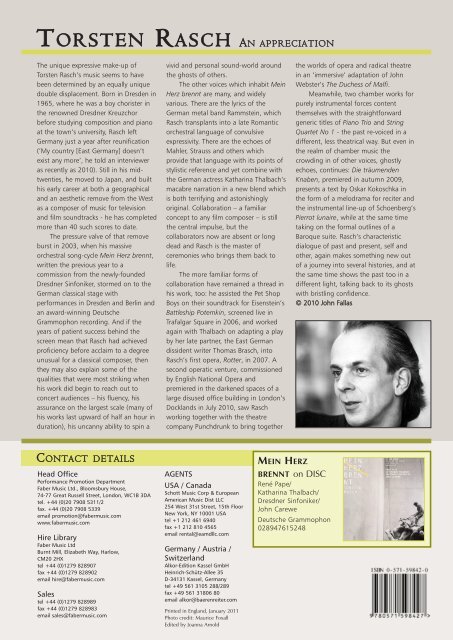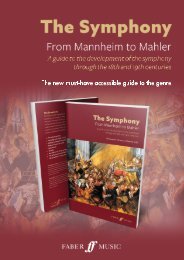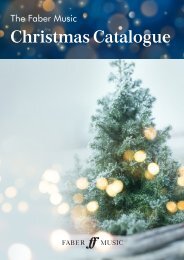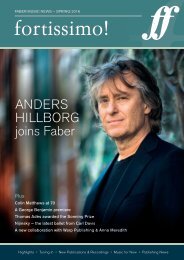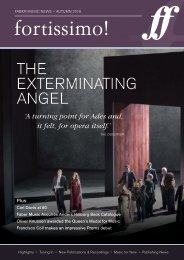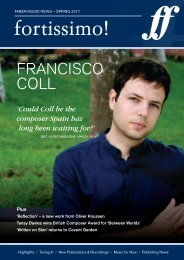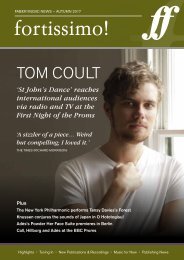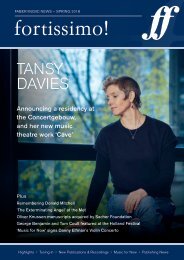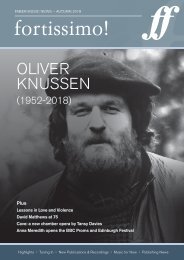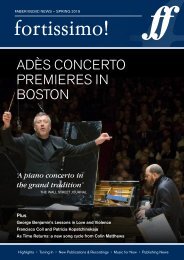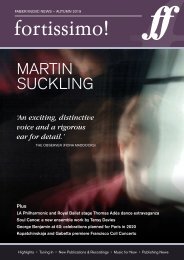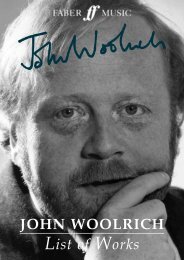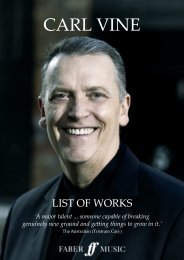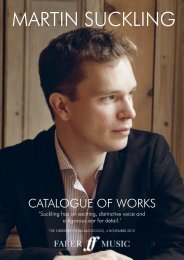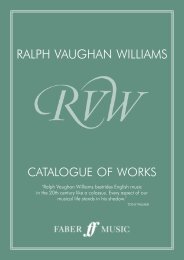Torsten Rasch Catalogue of Works
The expressive make-up of Torsten Rasch’s music is unique, with a fluency and assurance on the largest scale and an uncanny ability to spin a vivid and personal sound-world around the ghosts of others. Peruse his catalogue of works available from Faber Music here.
The expressive make-up of Torsten Rasch’s music is unique, with a fluency and assurance on the largest scale and an uncanny ability to spin a vivid and personal sound-world around the ghosts of others. Peruse his catalogue of works available from Faber Music here.
- No tags were found...
Create successful ePaper yourself
Turn your PDF publications into a flip-book with our unique Google optimized e-Paper software.
TORSTEN RASCH AN APPRECIATION<br />
The unique expressive make-up <strong>of</strong><br />
<strong>Torsten</strong> <strong>Rasch</strong>’s music seems to have<br />
been determined by an equally unique<br />
double displacement. Born in Dresden in<br />
1965, where he was a boy chorister in<br />
the renowned Dresdner Kreuzchor<br />
before studying composition and piano<br />
at the town’s university, <strong>Rasch</strong> left<br />
Germany just a year after reunification<br />
(‘My country [East Germany] doesn’t<br />
exist any more’, he told an interviewer<br />
as recently as 2010). Still in his midtwenties,<br />
he moved to Japan, and built<br />
his early career at both a geographical<br />
and an aesthetic remove from the West<br />
as a composer <strong>of</strong> music for television<br />
and film soundtracks - he has completed<br />
more than 40 such scores to date.<br />
The pressure valve <strong>of</strong> that remove<br />
burst in 2003, when his massive<br />
orchestral song-cycle Mein Herz brennt,<br />
written the previous year to a<br />
commission from the newly-founded<br />
Dresdner Sinfoniker, stormed on to the<br />
German classical stage with<br />
performances in Dresden and Berlin and<br />
an award-winning Deutsche<br />
Grammophon recording. And if the<br />
years <strong>of</strong> patient success behind the<br />
screen mean that <strong>Rasch</strong> had achieved<br />
pr<strong>of</strong>iciency before acclaim to a degree<br />
unusual for a classical composer, then<br />
they may also explain some <strong>of</strong> the<br />
qualities that were most striking when<br />
his work did begin to reach out to<br />
concert audiences – his fluency, his<br />
assurance on the largest scale (many <strong>of</strong><br />
his works last upward <strong>of</strong> half an hour in<br />
duration), his uncanny ability to spin a<br />
vivid and personal sound-world around<br />
the ghosts <strong>of</strong> others.<br />
The other voices which inhabit Mein<br />
Herz brennt are many, and widely<br />
various. There are the lyrics <strong>of</strong> the<br />
German metal band Rammstein, which<br />
<strong>Rasch</strong> transplants into a late Romantic<br />
orchestral language <strong>of</strong> convulsive<br />
expressivity. There are the echoes <strong>of</strong><br />
Mahler, Strauss and others which<br />
provide that language with its points <strong>of</strong><br />
stylistic reference and yet combine with<br />
the German actress Katharina Thalbach’s<br />
macabre narration in a new blend which<br />
is both terrifying and astonishingly<br />
original. Collaboration – a familiar<br />
concept to any film composer – is still<br />
the central impulse, but the<br />
collaborators now are absent or long<br />
dead and <strong>Rasch</strong> is the master <strong>of</strong><br />
ceremonies who brings them back to<br />
life.<br />
The more familiar forms <strong>of</strong><br />
collaboration have remained a thread in<br />
his work, too: he assisted the Pet Shop<br />
Boys on their soundtrack for Eisenstein’s<br />
Battleship Potemkin, screened live in<br />
Trafalgar Square in 2006, and worked<br />
again with Thalbach on adapting a play<br />
by her late partner, the East German<br />
dissident writer Thomas Brasch, into<br />
<strong>Rasch</strong>’s first opera, Rotter, in 2007. A<br />
second operatic venture, commissioned<br />
by English National Opera and<br />
premiered in the darkened spaces <strong>of</strong> a<br />
large disused <strong>of</strong>fice building in London’s<br />
Docklands in July 2010, saw <strong>Rasch</strong><br />
working together with the theatre<br />
company Punchdrunk to bring together<br />
the worlds <strong>of</strong> opera and radical theatre<br />
in an ‘immersive’ adaptation <strong>of</strong> John<br />
Webster’s The Duchess <strong>of</strong> Malfi.<br />
Meanwhile, two chamber works for<br />
purely instrumental forces content<br />
themselves with the straightforward<br />
generic titles <strong>of</strong> Piano Trio and String<br />
Quartet No 1 - the past re-voiced in a<br />
different, less theatrical way. But even in<br />
the realm <strong>of</strong> chamber music the<br />
crowding in <strong>of</strong> other voices, ghostly<br />
echoes, continues: Die träumenden<br />
Knaben, premiered in autumn 2009,<br />
presents a text by Oskar Kokoschka in<br />
the form <strong>of</strong> a melodrama for reciter and<br />
the instrumental line-up <strong>of</strong> Schoenberg’s<br />
Pierrot lunaire, while at the same time<br />
taking on the formal outlines <strong>of</strong> a<br />
Baroque suite. <strong>Rasch</strong>’s characteristic<br />
dialogue <strong>of</strong> past and present, self and<br />
other, again makes something new out<br />
<strong>of</strong> a journey into several histories, and at<br />
the same time shows the past too in a<br />
different light, talking back to its ghosts<br />
with bristling confidence.<br />
© 2010 John Fallas<br />
CONTACT DETAILS<br />
Head Office<br />
Performance Promotion Department<br />
Faber Music Ltd., Bloomsbury House,<br />
74-77 Great Russell Street, London, WC1B 3DA<br />
tel. +44 (0)20 7908 5311/2<br />
fax. +44 (0)20 7908 5339<br />
email promotion@fabermusic.com<br />
www.fabermusic.com<br />
Hire Library<br />
Faber Music Ltd<br />
Burnt Mill, Elizabeth Way, Harlow,<br />
CM20 2HX<br />
tel +44 (0)1279 828907<br />
fax +44 (0)1279 828902<br />
email hire@fabermusic.com<br />
Sales<br />
tel +44 (0)1279 828989<br />
fax +44 (0)1279 828983<br />
email sales@fabermusic.com<br />
AGENTS<br />
USA / Canada<br />
Schott Music Corp & European<br />
American Music Dist LLC<br />
254 West 31st Street, 15th Floor<br />
New York, NY 10001 USA<br />
tel +1 212 461 6940<br />
fax +1 212 810 4565<br />
email rental@eamdllc.com<br />
Germany / Austria /<br />
Switzerland<br />
Alkor-Edition Kassel GmbH<br />
Heinrich-Schütz-Allee 35<br />
D-34131 Kassel, Germany<br />
tel +49 561 3105 288/289<br />
fax +49 561 31806 80<br />
email alkor@baerenreiter.com<br />
Printed in England, January 2011<br />
Photo credit: Maurice Foxall<br />
Edited by Joanna Arnold<br />
MEIN HERZ<br />
BRENNT on DISC<br />
René Pape/<br />
Katharina Thalbach/<br />
Dresdner Sinfoniker/<br />
John Carewe<br />
Deutsche Grammophon<br />
028947615248


